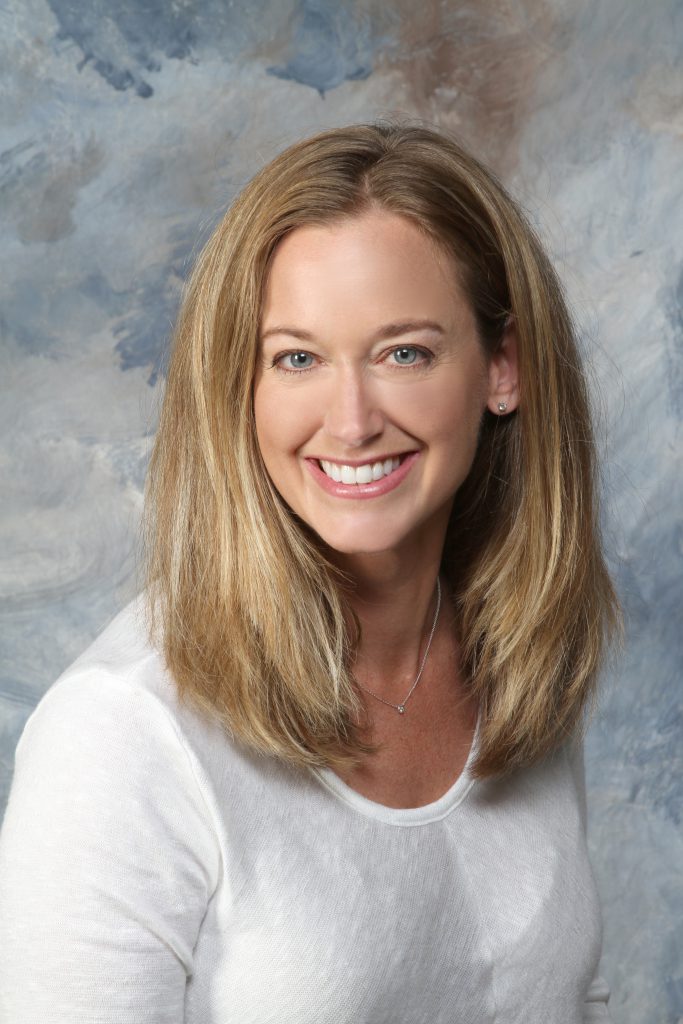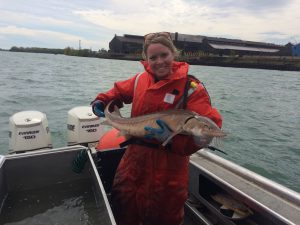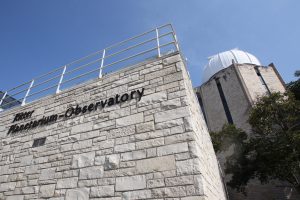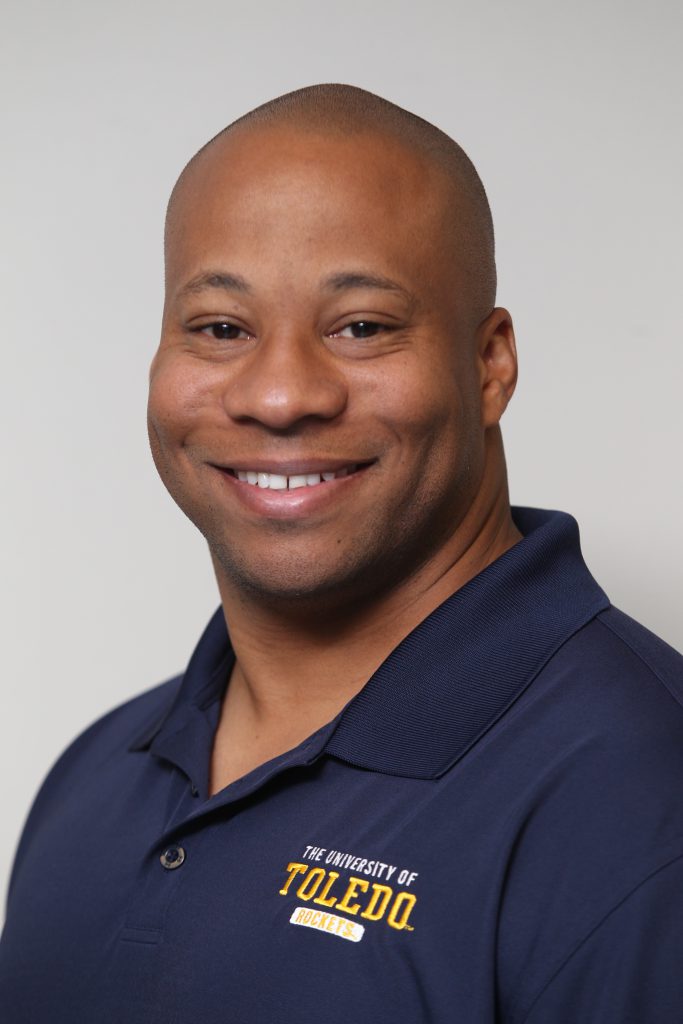Archive for August, 2017
Kick-off party for Back-to-School Drive to be held Aug. 10
Tuesday, August 8th, 2017The University of Toledo Judith Herb College of Education Alumni Affiliate is hosting its annual drive for new shoes, socks and underwear for students in Toledo Public Schools.
Alumni also will be collecting belts this year based on feedback from school administrators.
The kick-off party is from 5:30 to 7:30 p.m. Thursday, Aug. 10 at Social Gastropub in the Gateway Plaza on the corner of Dorr Street and Secor Road.
Donations will be collected during the event, and participants can sample free appetizers.
“We talk with school principals every year to see what students need,” said Mike Bader, president of the Judith Herb College of Education Alumni Affiliate. “As part of our mission to give back to our community, we are hoping to fill the great need for shoes, socks, underwear and belts.”
Gym shoes and dress shoes are needed for students in grades K-8 in youth and small adult sizes. The shoe sizes needed most are children’s sizes 1 to 6 or toddler sizes 10 to 13.
Underwear donations are needed for younger students.
Donations can be dropped off Monday through Friday from 8:15 a.m. to 5 p.m. in Driscoll Alumni Center Room 2014 on Main Campus before Thursday, Sept. 14.
For more information, visit toledoalumni.org or call 419.530.2586.
August UT Board of Trustees Meetings
Monday, August 7th, 2017BOARD OF TRUSTEES MEETINGS
Thursday, August 10, 2017
Radisson Hotel, 3100 Restaurant
8 a.m. Board of Trustees Social Breakfast
Wednesday, August 16, 2017
Driscoll Alumni Center, Schmakel Room
5:30 p.m. Board of Trustees Social Dinner
Monday, August 21, 2017
Mulford Library, Board Room
4 p.m. Privileging and Credentialing Subcommittee Meeting
This subcommittee will enter Executive Session immediately upon convening
the meeting to discuss privileged information related to the evaluation of
medical staff personnel appointments.
Thursday, August 24, 2017
Radisson Hotel, 3100 Restaurant
8 a.m. Board of Trustees Social Breakfast
Any questions may be directed to the Office of University Communications by calling 419.530.2410 or via email at meghan.cunningham@utoledo.edu.
UT psychologist challenges accuracy of method to interview child witnesses
Monday, August 7th, 2017The reliability of child witness testimony is a prime factor in cases of abuse, but how they are questioned can influence a child’s answers. When faced with choices a child will often pick one, even if the correct answer is not one of the options given.
New research by a University of Toledo psychologist supports asking open-ended questions and challenges an increasingly popular solution for forensic interviewers to add a “something else” alternative choice when questioning young children.

London Newton
“What we found in our research is that even when children may correctly choose the something else option when the other choices are not accurate, the follow-up answer also is inaccurate,” said Dr. Kamala London Newton, UT associate professor of psychology.
For example, a child is asked a question such as whether the interviewer said that her favorite fruit was an apple, a banana or something else. The interviewer never said anything about her favorite fruit, so the child does not know the correct answer. So the child responds with something else, but when prompted with “what is her favorite fruit?” the child replied “carrots.”
London Newton’s research, titled “Does it help, hurt or something else? The effect of a something else response alternative on children’s performance on forced-choice questions,” is published in the August issue of the American Psychological Association journal Psychology, Public Policy, and the Law. She co-authored the article with graduate students Ashley Hall and Nicole Lytle, who have since received their PhD degrees in developmental psychology from UT.
London Newton’s Developmental Psychology Lab studies the best practices in interviewing child witnesses, and she has provided expert testimony on the subject, with her work cited twice by the United States Supreme Court.
“Interviewing young children, particularly those preschool aged, can be a challenge because of their limited communication skills and the fact that they do not resist answering false and unanswerable questions,” London Newton said.
“While providing children choices increases the probability that the child will answer the questions, those answers are too often inaccurate,” she said. “That is especially true if children are asked a question but none of the answer choices provided are accurate because children generally do not reply that they do not know.”
That presents a challenge because child abuse professionals argue that answers to open-ended prompts are too sparse and so forced-choice questions are needed, but it is not possible for those professionals to always be sure that one of the choices they are giving the child is true, London Newton said.
For her latest study, London Newton and her research team interviewed 94 children ages three to five years old. The children had participated in a 20-minute event in which a research assistant touched children on different public locations of their body, such as the elbow, and asked them to show on a doll or drawing where they were touched. Then after a one-week delay the children were interviewed about that event with a series of questions in which half the participants were asked standard questions with two choices and the others were asked questions with those two choices and also given the something else option.
The researchers found that the addition of the something else option did not improve the accuracy of responses. This was the case for all three types of questions asked — true questions in which the correct answer was present, false questions in which no correct answer was provided and unanswerable questions that require speculation, for example is red heavier than yellow?
“Our research supports additional work in this field that shows that the most developmentally appropriate way to pose questions to young children is to avoid forced-choice options as much as possible,” London Newton said. “One of the biggest dangers of including a something else alternative is that it may incorrectly give the interviewers more confidence that the response is accurate. Our findings support that asking open ended questions is the best approach to interviewing young children.”
UT grad student selected as finalist for national fellowship from Sea Grant
Monday, August 7th, 2017A University of Toledo graduate student in biology who has been working to restore giant, ancient sturgeon to Lake Erie was recently selected as one of 61 finalists across the country by Sea Grant for the 2018 Knauss Fellowship.
As a finalist, Jessica Sherman Collier, PhD student researcher in UT’s Department of Environmental Sciences, will spend a year working in Washington, D.C., on water resource policy.

Jessica Sherman Collier, UT doctoral candidate in biology, holds a 32-inch, 40-pound lake sturgeon while surveying on the Detroit River with a crew from the U.S. Fish and Wildlife Service.
“I am very excited and quite honored to be selected for this fellowship,” said Sherman Collier, who was recommended to Sea Grant by her PhD adviser Dr. Jonathan Bossenbroek. “The Knauss Fellowship is an amazing opportunity, and I am so happy to represent The University of Toledo and the Great Lakes region while I am there.”
Sherman Collier will spend a week in November interviewing with up to 20 different federal agency and legislative offices, such as the National Oceanic and Atmospheric Administration, Department of Interior, National Science Foundation, U.S. Navy, and the Senate Committee on Commerce, Science and Transportation. After being matched with her fellowship placement, her work begins in February 2018.
“This is a great launch to Jessica’s career, and I hope she finds satisfaction doing work as a public servant for the betterment of our environment,” said Dr. Tim Fisher, geology professor, chair of the UT Department of Environmental Sciences and interim director of the Lake Erie Center.
“We are excited about the talent and perspectives the 2018 Knauss Fellowship finalists will bring to their executive and legislative appointments next year,” Jonathan Pennock, director of the National Sea Grant College Program, said. “The Knauss Fellowship is a special program for Sea Grant, and we are proud of the professional development and opportunities Sea Grant has provided our alumni, the current class and now these finalists.”
Knauss finalists are chosen through a competitive process that includes several rounds of review.
Since 1979, Sea Grant has provided more than 1,200 early-career professionals with firsthand experiences transferring science to policy and management through one-year appointments with federal government offices in Washington, D.C.
Sherman Collier, who also is president of the North American Sturgeon and Paddlefish Society Student Sub-unit, has been involved in the project to restore lake sturgeon to Lake Erie. Most recently, she helped the Toledo Zoo secure $90,000 in federal grant money to build a sturgeon rearing facility along the Maumee River, which flows into Lake Erie. Sherman Collier assisted the project by verifying that spawning and nursery habitat still exist in the Maumee River to sustain a population of the fish that can live to be 150 years old and grow up to 300 pounds and eight feet long.
“I have enjoyed working with partners at the zoo, as well as state and federal agencies to give these large and ancient fish a chance to thrive in Lake Erie once again,” Sherman Collier said. “This is an instance when scientists and natural resource managers have the opportunity to improve the state of an ecosystem by restoring a species that belongs there and to learn a good lesson about our actions in the past.”
UT College of Medicine students to receive white coats at ceremony
Wednesday, August 2nd, 2017The University of Toledo College of Medicine and Life Sciences will recognize first-year medical students during its official White Coat Ceremony 10 a.m. Thursday, Aug. 3 in Nitschke Hall Auditorium.
The ceremony, held during the week of orientation, welcomes medical students to the college and prepares them for undertaking a medical career. Highlights of the event include a welcome from the dean of the college, a keynote address on humanism in medicine and the presentation of white coats and recitation of the Medical Student Pledge of Ethics.
Dr. Christopher Cooper, executive vice president of clinical affairs and dean of the College of Medicine and Life Sciences, will officiate the ceremony in which 175 medical students will receive their white coats. More than 75 percent of the new students are Ohio residents and about 20 percent are from northwest Ohio.
“This traditional ceremony really underscores the foundation of the medical profession for first-year medical students,” Cooper said. “The white coat serves as a symbol of their achievement of being selected to medical school. Secondly, it reiterates their commitment to professionalism, continuing education and their service to others through medical care.”
The annual ceremony will conclude orientation week for the medical students. In addition to College of Medicine and Life Sciences, UT’s College of Pharmacy and Pharmaceutical Sciences holds a white coat ceremony for third-year PharmD students and the UT College of Health and Human Services presents white coats to first-year physical therapy and occupational therapy doctorate students and respiratory care students in their junior year, which is the first year of their professional program.
Watch solar eclipse at UT Aug. 21
Tuesday, August 1st, 2017On Monday, Aug. 21, a total solar eclipse will be visible from parts of the United States mainland for the first time in 38 years.
The University of Toledo’s Ritter Planetarium will host a free viewing event for the public from 12:30 to 4 p.m. on the campus lawn between Ritter and McMaster Hall.
 “We will be able to see an approximately 80 percent eclipse from Toledo, weather permitting,” said Alex Mak, UT associate planetarium director. “This is a rare opportunity, and we want to celebrate with the community.”
“We will be able to see an approximately 80 percent eclipse from Toledo, weather permitting,” said Alex Mak, UT associate planetarium director. “This is a rare opportunity, and we want to celebrate with the community.”
UT astronomers will have several safely filtered telescopes set up outside looking at the eclipse. A limited supply of solar eclipse glasses will be for sale for $2 each.
“We also will have a couple dozen ‘Personal Solar Observatory Boxes’ people can use at no cost,” Mak said.
In the event of clouds, a web stream of the eclipse from other locations across the country will be playing in McMaster Hall Room 1005.
Ritter Planetarium’s next three Friday night programs will focus on the eclipse. Programs are at 8:30 p.m. Aug. 4, 11 and 18. Admission is $7 for adults and $5 for members of the UT community. Children younger than 12 and senior citizens are free. For more information, go to ritter.utoledo.edu.
Mak also is giving free, public talks about the upcoming solar eclipse at branches of the Toledo-Lucas County Public Library as part of a grant UT received from the American Astronomical Association. The workshops are primarily intended for children. Guests receive a pair of solar eclipse glasses, informational handouts and planetarium guest passes. The library events are:
- 2 p.m. Wednesday, Aug. 2 at South, 1736 Broadway St.;
- 2 p.m. Thursday, Aug. 3 at Reynolds Corners, 4833 Dorr St.;
- 2 p.m. Monday, Aug. 7 at Locke, 703 Miami St.;
- 2 p.m. Tuesday, Aug. 8 at West Toledo, 1320 Sylvania Ave.;
- 3 p.m. Wednesday, Aug. 16 at Toledo Heights, 423 Shasta Drive; and
- 4 p.m. Friday, Aug. 18 at Birmingham, 203 Paine Ave.
“We want to get kids excited to watch the eclipse, make sure they do so in a safe manner and foster an interest in astronomy that can be maintained well after the eclipse,” Mak said.
UT names new Dean of Students
Tuesday, August 1st, 2017In his new role as interim associate vice president and dean of students, Dr. Sammy Spann will encourage students to get engaged on campus.
Spann, who has served The University of Toledo for 15 years most recently as assistant provost for career services, experiential learning and international programs overseeing the Center for International Studies and Programs, was appointed to the role effective July 15.

Spann
“We are fortunate to have someone with Sammy’s commitment to students and passion for higher education on our campus. He will be an enthusiastic champion for student success as dean of students,” said Dr. Phillip “Flapp” Cockrell, interim vice president of student affairs.
Spann, who has 18 years experience in higher education, joined UT in 2002 as director of Camp Adventure, a service-learning program he continues to be involved with today. Throughout his tenure at UT, he also has served as executive director of student engagement and assistant provost for international studies and programs.
“I look forward to working closely with students and my colleagues across the University to enhance the student experience here at UT,” Spann said. “I am passionate about getting students involved on campus and connected to opportunities to reinforce their education through real-world experiences. This is an exciting opportunity to help students be successful through those efforts.”
Sara Clark, director of global engagement and education abroad, will serve as the interim director for the Center for International Studies and Programs.
Spann is a UT alumnus receiving his PhD in special education from the University. He also has a master’s degree in special education and behavior disorders from the University of Northern Iowa and a bachelor’s degree in family and consumer sciences from Fort Valley State University in Georgia.
Prior to joining UT, Spann was a recruiter and retention specialist for Fort Valley State and a supervisor of education practicum experiences at Northern Iowa.
Undergraduate students to present summer research at symposium Aug. 3
Tuesday, August 1st, 2017More than 50 undergraduate students at The University of Toledo spent the past three months delving deep into research projects, including the transport and fate of algal bloom toxins in water distribution systems made of plastic pipe, preparing an experiment for microgravity crystal growth on the International Space Station, and skin penetration of caffeine from marketed eye creams.
One student studied the effect on the formation of ovarian cancer tumors of MLK3, a specific protein associated with the spread of cancer.
Students will present their work at the End-of-Summer Research Symposium from 9 a.m. to 4 p.m. Thursday, Aug. 3 in the Canaday Center and Gallery at Carlson Library. It is free and open to the public.
Dr. Andrew Hsu, UT provost and executive vice president for academic affairs, and Dr. Jonathan Bossenbroek, UT’s new director of the Office of Undergraduate Research, will give opening remarks at 9 a.m.
“These undergraduate students are enthusiastic and spent their summer working on projects ranging from molecular and cellular biology to theology, astronomy and engineering,” Bossenbroek said. “They’re strengthening their critical thinking skills and overall view of themselves as scholars with help from faculty members who serve as mentors.”
The symposium celebrates the accomplishments of the students who participated in the Undergraduate Summer Research and Creative Activity Program, the First-Year Summer Research Program, the National Science Foundation Research Experiences for Undergraduates Program, and the Toledo Talent Keeps Toledo Great Internship Program.
For more information, click here.

